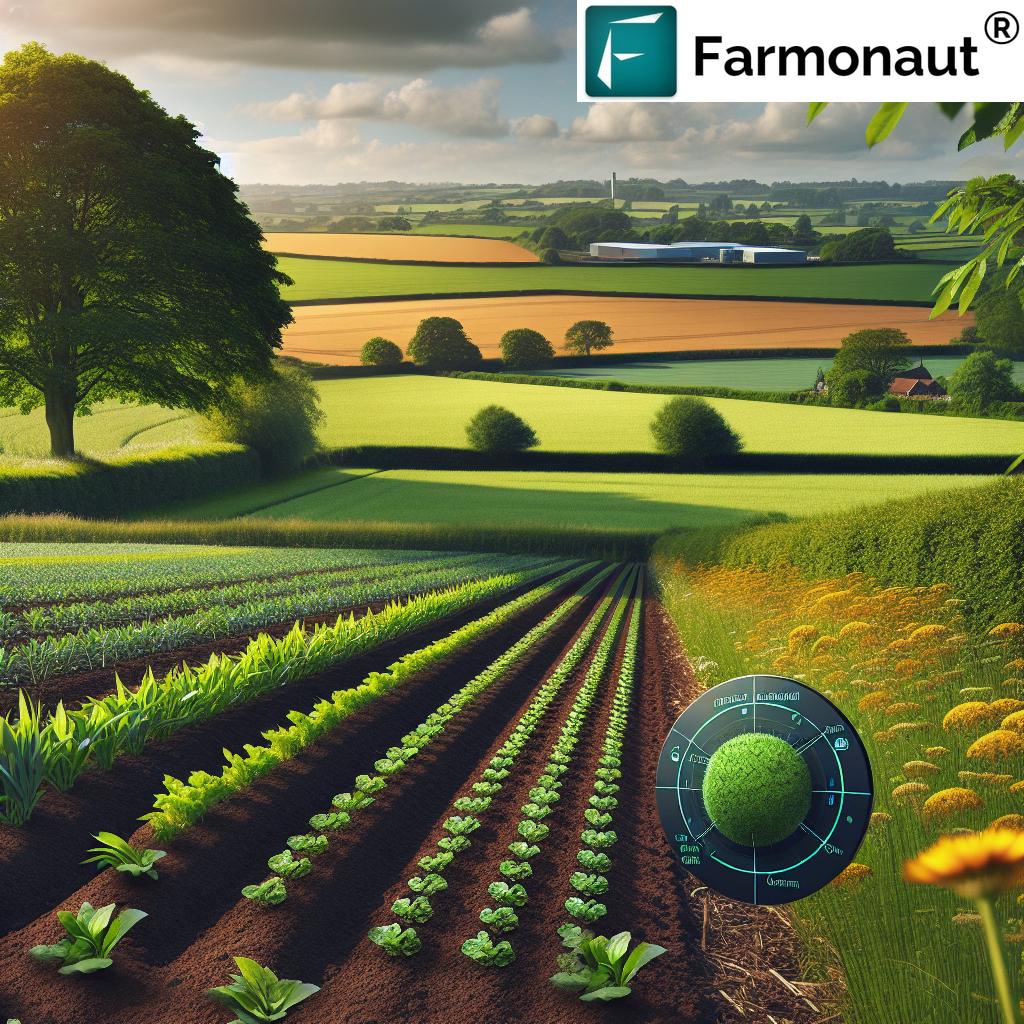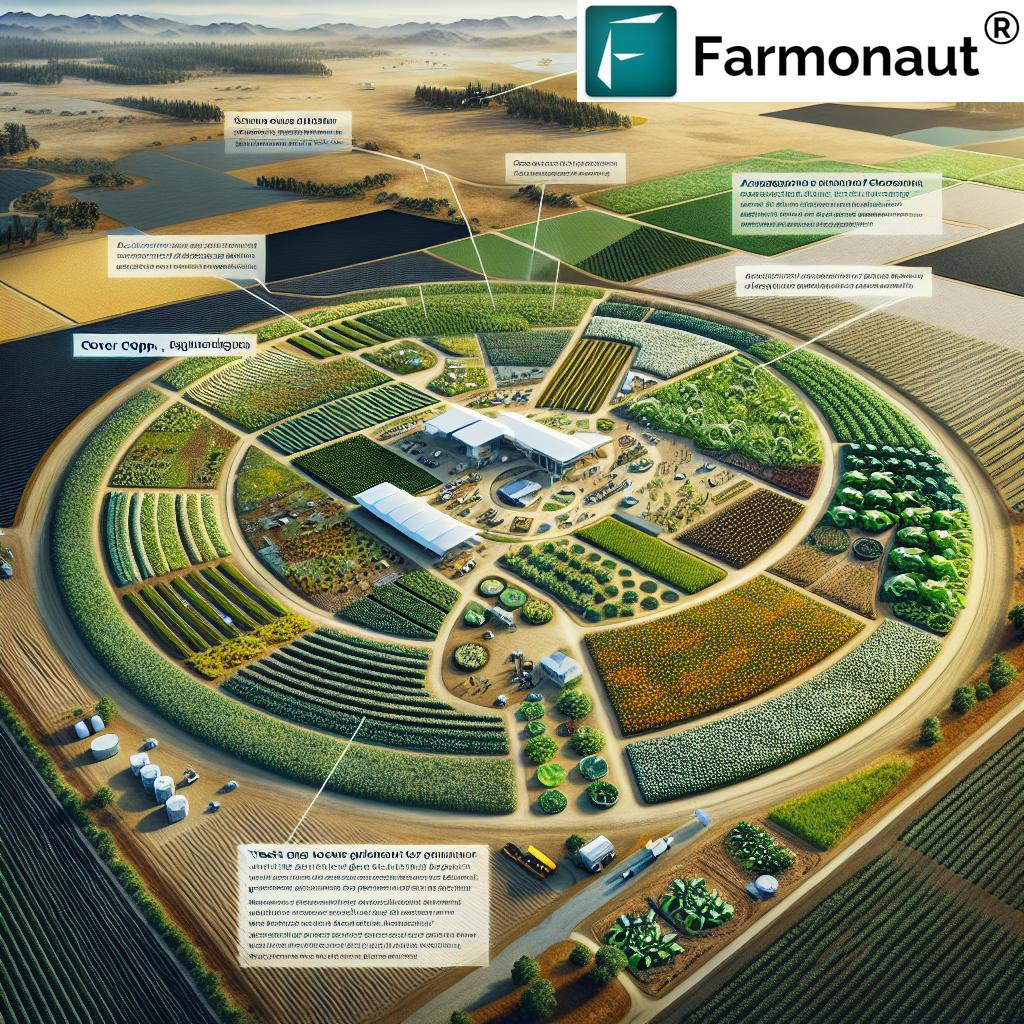Revolutionizing Sustainable Farming: How Innovative Practices Are Transforming Agriculture and Biodiversity Management
“Award-winning farmers implement at least 5 sustainable practices, including precision agriculture and carbon monitoring.”
In the ever-evolving world of agriculture, we are witnessing a remarkable transformation as innovative practices reshape the landscape of farming. At the forefront of this revolution are sustainable farming practices that not only enhance crop yields but also prioritize environmental stewardship and social responsibility. In this comprehensive exploration, we’ll delve into how these groundbreaking approaches are revolutionizing agriculture and biodiversity management, paving the way for a more sustainable and resilient future.
The Rise of Sustainable Farming Practices
Sustainable farming practices have become increasingly crucial in addressing the challenges faced by modern agriculture. As we strive to feed a growing global population while mitigating the impacts of climate change, innovative approaches to farming are taking center stage. These practices aim to balance productive agriculture with environmental conservation and social well-being.
One of the key drivers of this transformation is the recognition of farmers who excel in implementing sustainable methods. Agricultural sustainability awards are now highlighting the achievements of those who go above and beyond in their commitment to eco-friendly farming. These accolades not only celebrate current successes but also inspire future generations of farmers to adopt more sustainable approaches.

Precision Agriculture: The Game-Changer
At the heart of many award-winning farming operations is the implementation of precision agriculture techniques. This innovative approach utilizes advanced technologies to optimize resource use and maximize crop yields. By leveraging data-driven insights, farmers can make more informed decisions about planting, irrigation, and harvesting.
- Satellite imagery for crop health monitoring
- GPS-guided machinery for precise planting and harvesting
- Soil sensors for optimal fertilizer application
- Drone technology for targeted pest management
These precision agriculture methods not only improve efficiency but also significantly reduce the environmental impact of farming operations. By minimizing the use of resources such as water and fertilizers, farmers can achieve sustainable food production while preserving the ecosystem.
Carbon Monitoring: A Key to Sustainable Agriculture
One of the most exciting developments in sustainable farming is the integration of carbon monitoring in agriculture. This practice allows farmers to measure and manage the carbon footprint of their operations, contributing to global efforts to mitigate climate change.
Carbon monitoring involves:
- Assessing soil carbon levels
- Implementing carbon sequestration techniques
- Reducing greenhouse gas emissions from farm operations
- Participating in carbon credit markets
By focusing on carbon management, farmers can not only reduce their environmental impact but also potentially create new revenue streams through carbon credit programs. This approach exemplifies how sustainable practices can align environmental stewardship with economic benefits.
Soil Health Management: The Foundation of Sustainable Farming
At the core of sustainable agriculture lies effective soil health management. Farmers who excel in this area understand that healthy soil is the foundation for productive and resilient farming systems. By implementing practices that enhance soil quality, they can improve crop yields, increase water retention, and promote biodiversity.
Key soil health management practices include:
- Cover cropping to prevent erosion and add organic matter
- Crop rotation to improve soil structure and nutrient cycling
- Reduced tillage to preserve soil structure and microbial communities
- Composting and organic amendments to enhance soil fertility
These practices not only benefit the immediate farm ecosystem but also contribute to long-term environmental sustainability by sequestering carbon and reducing the need for synthetic inputs.
Biodiversity Management: Nurturing Nature on the Farm
Farm biodiversity management has emerged as a critical component of sustainable agriculture. Farmers who excel in this area recognize the importance of creating diverse ecosystems within their agricultural lands. By promoting biodiversity, they can enhance natural pest control, improve pollination, and create more resilient farming systems.
“Sustainable farming initiatives can increase farm biodiversity by up to 30% through wildlife conservation efforts.”
Effective biodiversity management strategies include:
- Creating wildlife corridors and habitats
- Maintaining hedgerows and buffer zones
- Implementing integrated pest management to reduce chemical use
- Preserving native plant species alongside crops
These approaches not only support wildlife conservation on farms but also contribute to the overall health and productivity of the agricultural ecosystem.

Community Engagement: The Social Aspect of Sustainable Farming
Sustainable agriculture extends beyond environmental considerations to encompass social responsibility and community engagement. Farmers who excel in this area understand the importance of building strong relationships with their local communities and fostering a sense of shared stewardship for the land.
Community engagement in agriculture can take many forms:
- Educational programs for local schools and community groups
- Farm tours and open days to showcase sustainable practices
- Partnerships with local food banks and community organizations
- Participation in farmers’ markets and community-supported agriculture programs
By engaging with their communities, farmers can raise awareness about sustainable food production methods and create a more connected and resilient local food system.
Innovative Approaches to Pest and Disease Management
One of the most challenging aspects of sustainable farming is managing pests and diseases without relying heavily on chemical interventions. Innovative farmers are developing and implementing creative solutions that protect crops while minimizing environmental impact.
Some cutting-edge approaches include:
- Biological control using beneficial insects and microorganisms
- Pheromone traps for pest monitoring and control
- Precision application of biopesticides using drone technology
- Crop diversity and companion planting to disrupt pest cycles
These methods not only reduce the need for synthetic pesticides but also contribute to overall farm biodiversity and ecosystem health.
The Role of Technology in Sustainable Farming
Advancements in technology are playing a crucial role in the transformation of agriculture towards more sustainable practices. From satellite imagery to artificial intelligence, these tools are empowering farmers to make more informed decisions and optimize their operations.
Farmonaut, a leading agricultural technology company, is at the forefront of this technological revolution. Their platform offers advanced, satellite-based farm management solutions that make precision agriculture accessible and affordable for farmers worldwide. Through their web application, mobile apps, and API, Farmonaut provides valuable services such as real-time crop health monitoring, AI-based advisory systems, and resource management tools.
Key technologies driving sustainable farming include:
- Satellite imagery for crop monitoring and yield prediction
- IoT sensors for soil moisture and nutrient monitoring
- Machine learning algorithms for pest and disease detection
- Blockchain technology for supply chain transparency
These technological advancements are not only improving farm productivity but also contributing to more sustainable and environmentally friendly farming practices.
The Impact of Sustainable Farming Practices
The adoption of sustainable farming practices is having a profound impact on agriculture and the environment. Let’s examine some of the key areas where these innovative approaches are making a difference:
| Practice | Crop Yield | Environmental Conservation | Community Engagement | Economic Sustainability |
|---|---|---|---|---|
| Precision Agriculture | ⭐⭐⭐⭐⭐ Significant increase in yield through optimized resource use |
⭐⭐⭐⭐ Reduced chemical use and water consumption |
⭐⭐⭐ Improved farm efficiency leads to better food security |
⭐⭐⭐⭐⭐ Higher profits due to reduced input costs |
| Biodiversity Management | ⭐⭐⭐ Moderate yield increase through improved ecosystem services |
⭐⭐⭐⭐⭐ Significant enhancement of local ecosystems and wildlife |
⭐⭐⭐⭐ Increased community interest in nature conservation |
⭐⭐⭐ Long-term economic benefits through ecosystem resilience |
| Carbon Monitoring | ⭐⭐ Indirect yield benefits through improved soil health |
⭐⭐⭐⭐⭐ Major contribution to climate change mitigation |
⭐⭐⭐ Raises awareness about climate impact of agriculture |
⭐⭐⭐⭐ Potential for carbon credit revenue |
| Integrated Pest Management | ⭐⭐⭐⭐ Improved crop quality and reduced losses |
⭐⭐⭐⭐ Significant reduction in chemical pesticide use |
⭐⭐⭐ Promotes safer working conditions for farm workers |
⭐⭐⭐⭐ Cost savings on pest control and potential premium prices |
This impact matrix clearly illustrates the multifaceted benefits of sustainable farming practices, showcasing how they contribute to improved crop yields, environmental conservation, community engagement, and economic sustainability.
The Future of Sustainable Agriculture
As we look to the future, it’s clear that sustainable farming practices will continue to play a crucial role in shaping the agricultural landscape. The challenges of climate change, population growth, and resource scarcity will require even more innovative approaches to food production.
Some key trends to watch include:
- Increased adoption of regenerative agriculture principles
- Further integration of AI and machine learning in farm management
- Development of climate-resilient crop varieties
- Expansion of urban and vertical farming techniques
By continuing to innovate and adapt, farmers and agricultural scientists can ensure a more sustainable and food-secure future for generations to come.
Embracing Technology for Sustainable Farming
As we continue to innovate in sustainable agriculture, technology plays an increasingly vital role. Platforms like Farmonaut are making it easier than ever for farmers to implement precision agriculture techniques and monitor their crops with unprecedented accuracy.
For those looking to leverage these technologies in their farming operations, Farmonaut offers several ways to get started:
- Web Application: Access Farmonaut’s powerful tools directly from your browser
- Mobile Apps: Take Farmonaut’s capabilities with you in the field


- API Access: Integrate Farmonaut’s data into your existing systems
- Developer Documentation: Learn how to leverage Farmonaut’s API for custom solutions
By adopting these technological tools, farmers can enhance their sustainable practices and contribute to the ongoing revolution in agriculture.
Conclusion: A Sustainable Future for Agriculture
The revolution in sustainable farming practices is transforming agriculture and biodiversity management in profound ways. From precision agriculture techniques to innovative approaches in pest management and community engagement, farmers are leading the charge towards a more sustainable and resilient food system.
As we’ve explored, these practices not only benefit the environment but also contribute to improved crop yields, economic sustainability, and stronger communities. The integration of technology, exemplified by platforms like Farmonaut, is accelerating this transformation, making sustainable farming more accessible and effective than ever before.
By recognizing and celebrating the achievements of farmers who excel in sustainable practices, we can inspire a new generation of agriculturists to embrace these innovative approaches. Together, we can build a future where agriculture not only feeds the world but also nurtures our planet and communities.
Frequently Asked Questions (FAQ)
- What are the key principles of sustainable farming?
Sustainable farming focuses on balancing productivity with environmental stewardship and social responsibility. Key principles include soil health management, water conservation, biodiversity promotion, and integrated pest management.
- How does precision agriculture contribute to sustainability?
Precision agriculture uses technology to optimize resource use, reducing waste and environmental impact while improving crop yields. This includes targeted application of inputs like water and fertilizers based on specific crop needs.
- What role does biodiversity play in sustainable farming?
Biodiversity in farming enhances ecosystem services like natural pest control and pollination. It also increases the resilience of farming systems to environmental stresses and climate change.
- How can farmers implement carbon monitoring in their operations?
Farmers can implement carbon monitoring through soil testing, tracking fuel use, and using technologies like satellite imagery to assess vegetation health. This data helps in developing strategies to reduce carbon emissions and increase carbon sequestration.
- What are some examples of community engagement in sustainable agriculture?
Community engagement can include educational farm tours, participation in local farmers’ markets, partnerships with schools for agricultural education, and involvement in community-supported agriculture (CSA) programs.



